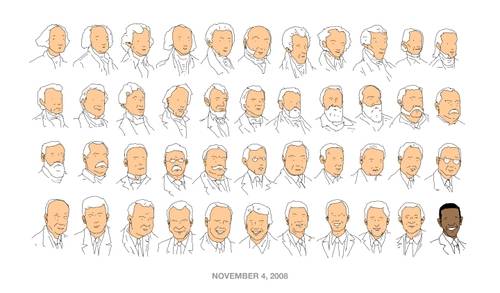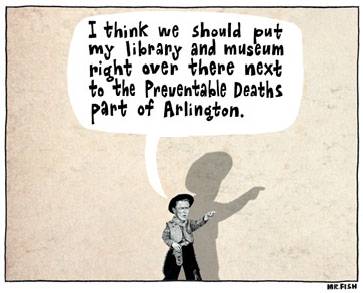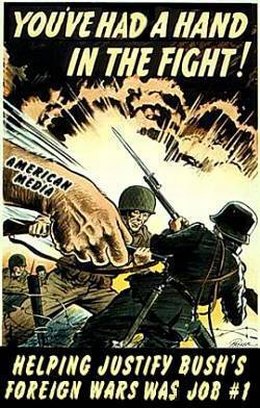
Wednesday, December 3, 2008
In Courtroom Showdown, Bush Demands Amnesty for Spying Telecoms

SAN FRANCISCO — The Bush administration on Tuesday will try to convince a federal judge to let stand a law granting retroactive legal immunity to the nation's telecoms, which are accused of transmitting Americans' private communications to the National Security Agency without warrants.
At issue in the high-stakes showdown — set to begin at 10:00 a.m. PST — are the nearly four dozen lawsuits filed by civil liberties groups and class action attorneys against AT&T, Verizon, MCI, Sprint and other carriers who allegedly cooperated with the Bush administration's domestic surveillance program in the years following the Sept. 11 terror attacks. The lawsuits claim the cooperation violated federal wiretapping laws and the Constitution.
In July, as part of a wider domestic spying bill, Congress voted to kill the lawsuits and grant retroactive amnesty to any phone companies that helped with the surveillance; President-elect Barack Obama was among those who voted for the law in the Senate. On Tuesday, lawyers with the Electronic Frontier Foundation are set to urge the federal judge overseeing those lawsuits to reject immunity as unconstitutional. At stake, they say, is the very principle of the rule of law in America.
http://blog.wired.com/27bstroke6/2008/12/feds-eff-arguin.html
Death of the American Empire


I believe that banking institutions are more dangerous to our liberties than standing armies. (Thomas Jefferson, US President; 1743 - 1826)
America is dying. It is self-destructing and bringing the rest of the world down with it.
Often referred to as a sub-prime mortgage collapse, this obfuscates the real reason. By associating tangible useless failed mortgages, at least something 'real' can be blamed for the carnage. The problem is, this is myth. The magnitude of this fiscal collapse happened because it was all based on hot air.
The banking industry renamed insurance betting guarantees as 'credit default swaps' and risky gambling wagers were called 'derivatives'. Financial managers and banking executives were selling the ultimate con to the entire world, akin to the snake-oil salesmen from the 18th century but this time in suits and ties. And by October 2008 it was a quadrillion-dollar (that's $1,000 trillion) industry that few could understand.
Propped up by false hope, America is now falling like a house of cards.
It all began in the early part of the 20th century. In 1907 J.P. Morgan, a private New York banker, published a rumour that a competing unnamed large bank was about to fail. It was a false charge but customers nonetheless raced to their banks to withdraw their money, in case it was their bank. As they pulled out their funds the banks lost their cash deposits and were forced to call in their loans. People now therefore had to pay back their mortgages to fill the banks with income, going bankrupt in the process. The 1907 panic resulted in a crash that prompted the creation of the Federal Reserve, a private banking cartel with the veneer of an independent government organisation. Effectively, it was a coup by elite bankers in order to control the industry.
When signed into law in 1913, the Federal Reserve would loan and supply the nation's money, but with interest. The more money it was able to print, the more 'income' for itself it generated. By its very nature the Federal Reserve would forever keep producing debt to stay alive. It was able to print America's monetary supply at will, regulating its value. To control valuation however, inflation had to be kept in check.
The Federal Reserve then doubled America's money supply within five years, and in 1920 it called in a mass percentage of loans. Over five thousand banks collapsed overnight. One year later the Federal Reserve again increased the money supply by 62%, but in 1929 it again called the loans back in, en masse. This time, the crash of 1929 caused over sixteen thousand banks to fail and an 89% plunge on the stock market. The private and well-protected banks within the Federal Reserve system were able to snap up the failed banks at pennies on the dollar.
The nation fell into the Great Depression and in April 1933 President Roosevelt issued an executive order that confiscated all gold bullion from the public. Those who refused to turn in their gold would be imprisoned for ten years, and by the end of the year the gold standard was abolished. What had been redeemable for gold became paper 'legal tender', and gold could no longer be exchanged for cash as it had once been.
Gaza:A Bare Life Zone nearing to a no-life-zone


Power cuts and daily blackouts resulted in hindering of all facilities depending on power. The remaining power shares provided by Israel and Egypt are not enough to cover the whole coastal strip. Pumped fresh water is not reaching all living places, farms and central water wells. Sewage and treatment water machines are halted. Additionally around 77 million liters of sewage water leak into the Mediterranean contaminating it and damaging fish resources on daily basis.
According to Popular Committee against Siege PCAS, basic food stuff like milk, flour, food oils, meat, rice and legumes are not available with big quantities. Other needs are not available like raw materials needed to operate small food factories.
Estimates for daily consumption of the following food products in the Gaza Strip are: 867 tons of flour, 153 tons of sugar, 110 tons of rice, 75 tons of different kinds of oil and 49 tons herbs and vegetables. According to crossing administration only 15 % of Gaza needs get in.
A severe shortage of basic medicines is up to 40%. Medicines of diabetes, heart, asthma and other chronic diseases are vanished from Gaza. Additionally, other kind of medicines for Cancer, Lennar and liver failure face sharp shortages. Sterilization and Disinfection and medical equipments and clothes face decrease up to 30%. There is severe shortage in Solutions and pigments and laboratories tools. These shortages amounted of 40% directly affect patients. -Some Medical Machines are in bad need for spare parts and maintenance. Due to siege none of the needed is being achieved. Medical machines of Gas measurements of children incubators are being affected as well. The power cuts and continued blackouts damaged part of machines and its programming systems. Damage hit C.T and X.Ray Departments at al Shifa' and European hospitals. These are so crucial to diagnosis tumors of cancer and other diseases. Spare parts for medical T.V are not available!
It was a due on Israel to open commercial crossings completely during the calm. But, Israel didn't abide by that condition as she partially opened them. But within the last week; Israel totally closed them causing a huge humanitarian crisis. According to UNRWA, around 750,000 of its beneficiaries don't get their devoted share of food parcels. With the Israeli ban on UNRWA aid, it is ensuring that a dire humanitarian crisis will occur within days. As UNRWA is also under siege from assisting Palestine in humanitarian causes, long time projects such as housing are halted to the loss of $350 million.
Calling Bullshit On The Obama Ring Story
By Hamilton Nolan
 President-elect Obama—allegedly a 'man of the people'—is allegedly buying a fancy $30,000 ring for his fancy wife, allegedly! It was in the trusty Daily Mail, and now it's the top story on Drudge, meaning it is the single most important news story in all the world. Elitist Obama drops 30K on bling for his wife during a recession—and this bling will be made out of rhodium, the world's most expensive metal! This story is almost certainly bullshit, and we will tell you exactly why. [Updates below—we were right]:
President-elect Obama—allegedly a 'man of the people'—is allegedly buying a fancy $30,000 ring for his fancy wife, allegedly! It was in the trusty Daily Mail, and now it's the top story on Drudge, meaning it is the single most important news story in all the world. Elitist Obama drops 30K on bling for his wife during a recession—and this bling will be made out of rhodium, the world's most expensive metal! This story is almost certainly bullshit, and we will tell you exactly why. [Updates below—we were right]:1. The setup—Say, for argument's sake, that Obama did order an expensive, custom-made ring to thank his wife for her help in the campaign. Would the chosen designer of that ring run out and immediately tell the press all about it? Not just the press, but the Daily Mail, a sleazeball London tabloid? No, because that designer would subsequently be destroyed by Barack Obama, the president of the US.
2. The story itself—What's the sourcing for this big story? Did Obama sheepishly acknowledge his gift with a smile once it broke? No. The sole source is a "spokesman" for the "designer" of the ring. Who also gave this ridonkulous quote:
'For obvious privacy reasons I cannot reveal the cost of the ring but bearing in mind it is made from rhodium or black gold and encrusted with diamonds you can be sure it will cost thousands of pounds.'
Mmm hmm. Classy. It's also painfully clear that the story is filled out by fun facts about rhodium pulled off some press release. Did you know that "rhodium was chosen as the material for the disc presented to Beatle Paul McCartney for being history's all-time best-selling songwriter and recording artist"? Barack Obama obviously did, which is why he insisted on ordering this here ring!
http://gawker.com/5100784/calling-bullshit-on-the-obama-ring-story
Why do we give gifts during the holiday season?
BY DAVE BARRY

We do it for a reason that is as timeless as humanity itself: women. Women have an overpowering biological need to mark pretty much every occasion, including sunset, by wrapping a gift and giving it to somebody, along with a card.
Why do women do this? We put that question to some leading psychologists, who responded: ``We think maybe they're insane.''
We would not go as far as leading psychologists. But it is a fact that as the holiday season approaches, women are overpowered by the biological urge to buy bulk quantities of gifts, often without any clear idea whom a specific gift is for.
Men do not do this. A man buys a gift only when he sees a clear and present need, such as he remembers that his wedding anniversary was last week. Otherwise, when a man is in a store, he is looking for practical items. If he happens to pass by, say, a little ceramic statuette of two little smiley-face turtles with ''BEST'' painted on one shell and ''FRIENDS'' painted on the other, he is not going to give it a second glance, because he can't imagine anybody having any use for such a thing except as an emergency substitute for a clay pigeon.
No, a man is going to keep right on walking past the friendship turtles. If he buys something for somebody -- his wife, for example -- it is going to be something he believes she actually needs, such as an extension cord. Maybe, if he is feeling especially romantic, he will get her the 20-footer.
Whereas many women (you know who you are) will buy the turtles, not because they know of anybody who needs friendship turtles, but because the turtles are, quote, ''cute.'' Then the woman will start shopping for a cute card to go with the turtles, or maybe several cards, since she's not sure which specific one of her numerous best friends will be getting them. While she's at it she might buy some cute little scented candles that would go with the turtles, and maybe a few other cute things. By the time she leaves the store, she will have as many as eight gifts for people who have yet to be identified. She may have totally forgotten why she went into the store in the first place (to get an extension cord).
http://www.miamiherald.com/dave_barry/gift-guide/story/782141.html
The Future of the Internet And How to Stop It
Keeping the Net Stupid
A review by Hal AbelsonThe spectacular achievement of the Internet is a success that has many parents. But when it comes to engineering design, a top honor must go to the decision to make the Net "stupid": Let the network perform its limited function of transmitting bits, and leave "smarter" functions, such as encryption, content filtering and quality of service, to be supplied by the computers attached to the network rather than by the network core itself. In other words, let the network do its basic job while staying out of the way of everything else. In 1984, three designers of the Internet communications protocols -- Jerome H. Saltzer, David P. Reed and David D. Clark -- published a paper in ACM Transactions on Computer Systems in which they dub this approach the end-to-end principle. It spawned a communications system of enormous flexibility, one that was able over the course of a quarter-century of mind-boggling innovation and growth to adapt to accommodate numerous new devices and applications.
The end-to-end principle demonstrates the Internet designers' good sense, and their humility, in appreciating that they could not possibly predict in the early 1970s all the things people might want to use the Net for. They chose therefore to restrict those potential uses as little as possible. End-to-end as an engine of innovation has become a watchword in communications policy as well as technology (see, for example, Lawrence Lessig's The Future of Ideas: The Fate of the Commons in a Connected World [2001]). And end-to-end arguments have permeated much of the wrangling over "network neutrality" over the past year as advocates of network neutrality have appeared before Congress and the Federal Communications Commission.
Yet end-to-end has a dark side. After all, if you can use the Net for anything, then you can use it for anything -- including spam, denial-of-service attacks and computer break-ins carried out by spoofing IP addresses or poisoning domain-name server caches, all of which are enabled by the simplicity of the Internet's core architecture.
http://www.powells.com/review/2008_11_30.html
Sphere: Related ContentThe policies that ruined the auto industry

Don't blame the Detroit 3
By BARRY C. LYNN
A lot of people are angry at the Detroit Three automakers, including many members of Congress. And why not?
Viewed over the long haul, the all but complete bankrupting of the Big Three is a stunning event. Not long ago the American auto industry was the greatest manufacturing complex in the world. Had a competitor nation consciously intended to destroy this system the result today would surely count as one of history's great coups. Yet no strategist in Tokyo, Brussels or Beijing cooked up this blitzing of Detroit. Rather it was the product of a set of incoherent policies made right here in America. The environment of law in which these companies had to operate in recent decades all but guaranteed their destruction.
So many factors work against America's manufacturers today – tax policies, monetary policy, the structure of metals markets — that it's hard to figure out what to fix first. But let's consider four of the biggest, and these in relation only to the auto industry and only to Japan:
*Corporate Governance. American managers are expected to "share out" much of the profits they gather with investors. Japanese managers are expected to reinvest most of their profits in new technologies, machines, and people.
*International Trade System. The Big Three have enjoyed no protection on their home turf since the 1960s. The Japanese market, by contrast, is still far more closed than the U.S., which means Toyota and Honda are today still able to "tax" Japanese buyers to subsidize their operations in America.
*Energy Policy. Beginning in the 1980s Congress structured fuel efficiency standards in ways that all but forced Big Three to shift investment and marketing from next-generation cars to last-generation trucks. In Japan, the structurally high price of gasoline has for decades provided a strong incentive to invest in leading technologies.
*Industrial Unions. The Taft-Hartley Act of 1947 created a patchwork regulatory system that allows the same company to treat workers in different states in different ways. Unlike GM and Ford, which are held in place in union-friendly states by the UAW, Japanese firms that manufacture in America are free to invest wherever they wish. This happens to be, almost always, in "right-to-work" states.
Two systems. One marketplace. After 30 years the results of this clash are: Detroit is prostrate.
Confronting the Terrorist Within
 |
| AP file photo |
| A mother tends to her injured child in a hospital 35 miles northeast of Baghdad after a U.S airstrike that killed three civilians and wounded five others. |
By Chris Hedges
The Hindu-Muslim communal violence that led to the attacks in Mumbai, as well as the warnings that the New York City transit system may have been targeted by al-Qaida, are one form of terrorism. There are other forms.
The wars in Iraq and Afghanistan, when viewed from the receiving end, are state-sponsored acts of terrorism. These wars defy every ethical and legal code that seek to determine when a nation can wage war, from Just War Theory to the statutes of international law largely put into place by the United States after World War II. These wars are criminal wars of aggression. They have left hundreds of thousands of people, who never took up arms against us, dead and seen millions driven from their homes. We have no right as a nation to debate the terms of these occupations. And an Afghan villager, burying members of his family's wedding party after an American airstrike, understands in a way we often do not that terrorist attacks can also be unleashed from the arsenals of an imperial power.
Barack Obama's decision to increase troop levels in Afghanistan and leave behind tens of thousands of soldiers and Marines in Iraq—he promises only to withdraw combat brigades—is a failure to rescue us from the status of a rogue nation. It codifies Bush's "war on terror." And the continuation of these wars will corrupt and degrade our nation just as the long and brutal occupation of Gaza and the West Bank has corrupted and degraded Israel. George W. Bush has handed Barack Obama a poisoned apple. Obama has bitten it.
http://www.truthdig.com/report/item/20081201_confronting_the_terrorist_within/
Look Out: Explosive Country!
by Sara Daniel, Le Nouvel Observateur

One refugee from the tribal regions told Sara Daniel, "Everything you see here is a performance for the benefit of the Americans: me and the UN tents, we're part of the décor!" (Photo: Paul Jeffrey / ACT International)
At Washington's request, the Pakistani army has grudgingly undertaken to reestablish its authority in the tribal regions where Afghan Taliban and bin Laden's fighters move around freely. But the multiple blunders of American bombing are not helping Islamabad to fight against jihadists' growing influence ...
It's a dying world that is afraid. An aristocracy living on borrowed time that knows nothing will ever be the same again as before. In the Punjab governor's sumptuous palace, visitors are escorted from anterooms to reception rooms by servants wearing violet tunics and complicated turbans reminiscent of the Indian Empire era. Sideboards groan under spiced sweets and cardamom puddings. Governor Salman Taseer, a PPP member clothed entirely in white, is delighted with the new functions he enjoys since his friend Asif Ali Zardari, Benazir Bhutto's widower, became Pakistan's president. Is not Punjab (with 60 percent of the country's population) Pakistan's most important province, and, most particularly, the army's fiefdom? Salman Taseer listens to himself speak on television, tries on his Astrakhan hat for indulgent friends. He'd like to see his portrait on the wood-paneled walls of this boardroom where two British governors are already on display. But nobody is taken in. Not even his wife, who has undertaken the palace's restoration to its imperial splendor: "What's the use? And for how long?" she sighs, one does not know whether over the difficulty of removing the ocher dust from the recesses of this immense house or over the political situation of her husband, whom opposition party head Nawaz Sharif's minions dream of supplanting, or over the repercussions of the economic crisis, which has brought the Pakistani government to the verge of bankruptcy ... or over Islamic terrorism forewarning civil war.
Blog Archive
- ► 2009 (3416)
-
▼
2008
(2217)
-
▼
December
(345)
-
▼
Dec 03
(15)
- Spot the new president
- In Courtroom Showdown, Bush Demands Amnesty for Sp...
- Death of the American Empire
- Gaza:A Bare Life Zone nearing to a no-life-zone
- The Bush Library
- Calling Bullshit On The Obama Ring Story
- Why do we give gifts during the holiday season?
- You've had a hand in the fight!
- Revoking powers
- The Future of the Internet And How to Stop It
- Come to Sunny Saudi Arabia
- The policies that ruined the auto industry
- Confronting the Terrorist Within
- Look Out: Explosive Country!
- The Bush Years
-
▼
Dec 03
(15)
-
▼
December
(345)












